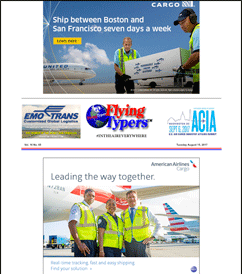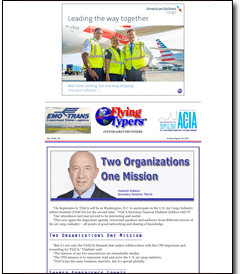It feels as though
major international developments are happening faster and faster these
days, with tremendous potential to impact global logistics. To stay
ahead of the game in this unprecedented time, we must ask ourselves:
how will these global politics affect the airline industry?
In my previous articles, I have argued
that airlines have never faced such an uncertain environment before.
Changing
Approach To Trade
After decades of promoting
globalization and free trade, American policy has shifted dramatically,
seeking to put an end to “unfair trade,” promote the domestic
market, and end the past “appeasement policy” to international
treats.
If successful, this shift in policy
will have major implications for the U.S. economy.
A more domestically-oriented economy
could propel the U.S. dollar upward, which typically triggers an increase
in imports as foreign goods become relatively cheaper. That traditional
rebalancing may be impossible due to the renegotiation of trade agreements
and increased tariffs, and what then?
Will the Federal Reserve Bank intervene?
Business
Adjusts
Business is already
adjusting to the new environment, attempting to predict the impact
of policy changes on their business models.
The U.S. economy is currently very
healthy, with the stock market at an all-time high and unemployment
at near record lows.
Despite the political rhetoric, most
economic indicators show continued growth under the Trump administration,
and U.S. airlines are already benefiting.
String
Employment
The July 2017 job
report from the Department of Labor indicated higher than expected
employment growth along with increases in wages, indicating that the
labor market is the strongest it’s been since the financial
crisis.
Strength in the domestic economy is
boosting stocks, with the Dow Jones Index breaching 22,000 on the
positive news. Stock market gains have stoked consumer demand, increasing
American wealth by about $4 trillion, translating into greater buying
power for international travel, vacations, and home buying and entertainment.
Readies
Tax Reductions Big Jump 2018
Corporate tax reduction,
a priority for the Trump administration, could add further stimulus
to the economy.
If the Trump administration’s
pro-growth tax-cutting plan is fully enacted, 3 percent-plus GDP growth
may be right around the corner.
In an already strong labor market,
many see this quickly translating into full employment and increased
wages.
If that materializes, the bump we’re
experiencing today will look like small potatoes compared to the expansion
set to kick in in 2018-2019.
The
Challenge To Airlines
Though the growth
outlook is very positive for U.S. airlines, the current environment
is not without its challenges.
Rapid growth requires expanding fleets
with modern aircraft, hiring more experienced pilots to fly them,
and bringing in qualified A&P mechanics to keep them safely operating.
Current estimates indicate that U.S.
airline demand for qualified pilots is at approximately 6,000 per
year, with supply less than half of that.
Likewise, the industry faces a shortage
of qualified mechanics.
These personnel shortages threaten
to slow airline growth and trigger a bidding war for talent, further
decreasing the U.S. supply of new pilots.
In other words, if Americans who want
to be commercial pilots sign on with non-U.S. airlines who have lower
flying hour requirements (250 hours vs. the 1,000 to 1,500 hours for
U.S. pilots), look out for the squeeze.
Air
Cargo Meet The Future
The U.S. non-integrator
cargo fleet has an additional problem.
New economic policies, such as “Made
in America – Sold in America,” will likely reduce international
air cargo to and from the U.S.
For example, Apple recently changed
its operations in anticipation of the rule, eliminating assembly in
China in favor of building iPhones for the U.S. market inside the
United States from locally produced components.
The Apple move, if expanded by other
companies, could take a huge bite and have a substantial negative
effect on trans-Pacific cargo demand, which together with the pilot/mechanic
shortage increases pressure on non-integrator cargo carriers.
Uncertain
Trump Policy
Another airline concern
is the uncertainty over the Trump administration’s policy on
trade.
President Trump championed renegotiating
the rules to secure “Fair Trade,” which could impact cargo
volumes between the U.S. and China, America’s largest trading
partner. Likewise, increasing tension with North Korea is driving
anxiety about regional trade, potentially disrupting trade with South
Korea, America’s 6th largest trading partner. The follow-on
effects of these developments may include a rebalancing of trade with
other Asian nations, or a decrease in overall trade levels, and air
cargo carriers will have to evaluate the likelihood of each.
The trade question in Europe is also
complicated.
As relations worsen with Russia as
a result of many factors and the approval of additional trade sanctions,
the level of cargo from Russia will decrease, though given the relatively
low current level (Russia is only the 30th largest trade partner of
the U.S.), the swing is unlikely to be large.
Germany is a more significant player—it
is America’s 5th largest trade partner, and President Trump’s
policy of reducing our trade deficit with Germany could mean substantially
less air freight ahead.
Euro
Gains Ground
These developments
are taking place in a climate of uncertainty around currency values,
and specifically the prospect of a strengthening U.S. dollar.
The Euro has steadily gained ground on
the dollar since the beginning of April 2017 and represents about a
14 percent rise from the multi-year low seen at the end of December
2016. All this points towards rising confidence in the Eurozone and
weakening expectations of positive economic and monetary stimulus action
in the U.S.
With the strong numbers we’re seeing
in the U.S. economy, it remains to be seen if this is a long-term trend,
or if the tide will turn in currency markets.
As with all these other developments,
airlines will need to weigh the risks and plan for every contingency.
Bill
Boesch
 Mr.
Boesch started his career in global transportation and logistics
in 1965 working for Seaboard World Airlines. He later joined
Flying Tiger Airlines and Emery Worldwide. Mr. Boesch then left
Emery to become Pan American World Airways’ Senior Vice
President where he headed both Passenger and Cargo Sales and
Operations. He left Pan Am to lead American Airlines’
Cargo operation and retired from AA in 1998. Under his direction
American became a world leader in the air cargo and logistics
business. Mr.
Boesch started his career in global transportation and logistics
in 1965 working for Seaboard World Airlines. He later joined
Flying Tiger Airlines and Emery Worldwide. Mr. Boesch then left
Emery to become Pan American World Airways’ Senior Vice
President where he headed both Passenger and Cargo Sales and
Operations. He left Pan Am to lead American Airlines’
Cargo operation and retired from AA in 1998. Under his direction
American became a world leader in the air cargo and logistics
business.
Mr.
Boesch was part of the extensive on site planning and support
of the Iraq drawdown, involvement with the Afghanistan operations,
and has worked on all aspects of the Civil Reserve Air Fleet
(CRAF) from both an airline and government standpoint.
Mr. Boesch has also served as
Chairman of the International Air Transport Association (IATA)
Cargo Executive Subcommittee in 1996 and 1997, Vice Chairman
of IATA’s Cargo Committee. Mr. Boesch served on the Board
of Directors of Air Cargo Incorporated, Air Cargo International,
The International Air Cargo Association (TIACA), Envirotainer,
Cargo Logistics Solutions, Deutsche Post/DHL Global Mail, al
Seqir and consulted for major U.S. companies including Flight
Safety.
Mr. Boesch is the recipient of
numerous awards including the Lifetime Air Cargo Achievement
Award, the Ellis Island Medal of Honor and various awards from
the U.S. Department of Defense.
Mr. Boesch is presently continuing
his work for the U.S. Government and heads up The Council For
Logistics Research.
|
To Read Part 1 of This Series, Click Here
To Read Part 2 of This Series, Click Here
To Read Part 3 of This Series, Click Here
To Read Part 4 of This Series, Click Here
To Read Part 5 of This Series, Click Here
To Read Part 6 of This Series, Click Here
To Read Trump Effect—India Walks Softly Carries Big Stick, Click Here
To Read Trump Effect—Implications Of A Trump Trade War, Click Here
To Read Trump Effect—Trump Across The Pacific, Click Here




 Vol.
16 No. 65
Vol.
16 No. 65 Vol.
16 No. 66
Vol.
16 No. 66